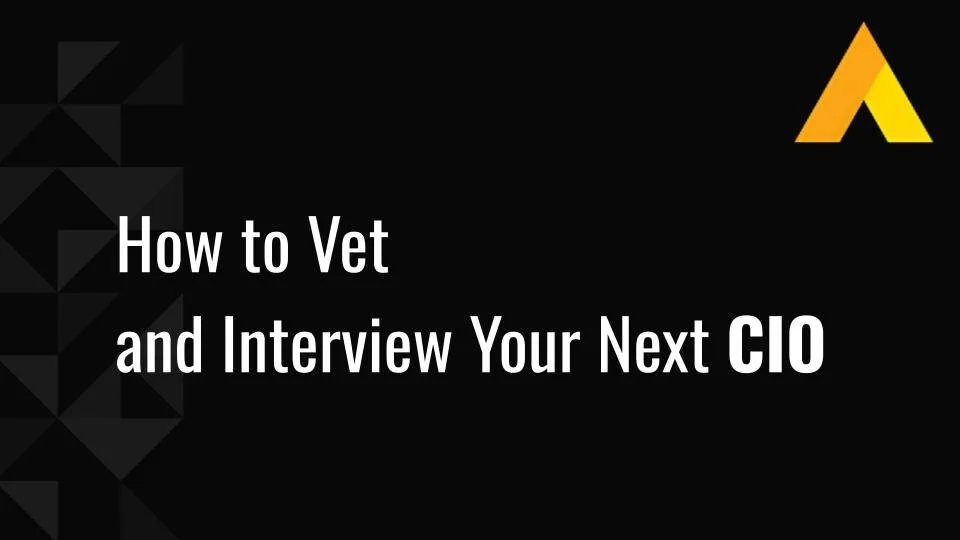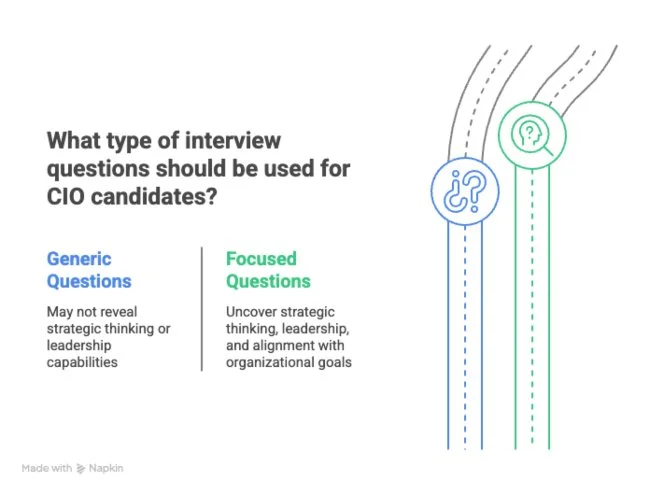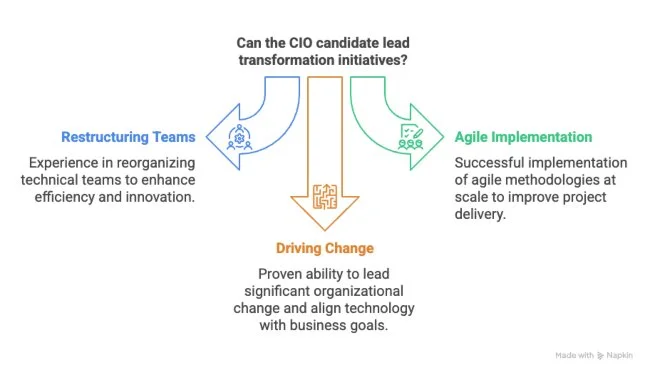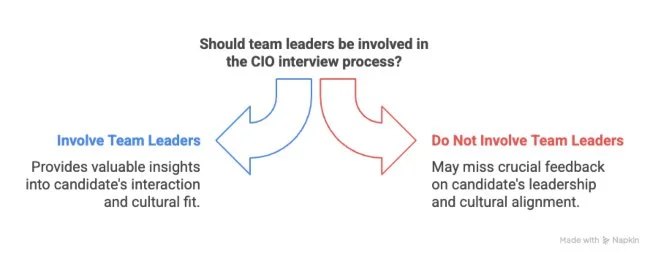How to Vet and Interview Your Next CIO
Hiring a Chief Information Officer is a critical role for any organization. The right CIO will drive your digital transformation and shape your future growth.
But vetting and interviewing for this executive-level position takes more than asking a few job interview questions. You’re evaluating technical skills, leadership ability, and how well they fit with your company culture.
You also need a deep understanding of your candidate’s approach to leadership, their past business outcomes, and how they’ve managed transformation initiatives.
This guide breaks down how to run a strategic interview process.
What Makes a Great CIO?
A great CIO does more than manage IT systems. They lead transformation, connect digital strategy with business goals, and make sure technology drives real business outcomes.
Here’s what to look for:
1. Deep Knowledge of Current Technologies
The best CIOs stay sharp on current technologies, from cloud platforms to AI tools. This deep understanding lets them guide technical teams and vet new technology solutions that make sense with your strategic plans.
2. Strong Technical Skills and Leadership
CIOs must have the tech skills to talk with engineers and the communication skills to explain systems to non-technical stakeholders. It’s this flexibility and fluency that earns trust across team members and with the executive team.
3. Business Perspective
CIOs are not just tech experts, they’re strategic business advisors. They should understand different business models, your company size, and how to prioritize IT resources based on business unit needs.
4. Experience Leading Transformation Initiatives
Ideally, you want someone who’s already led a digital transformation. That could include building a cybersecurity team, scaling agile development, and integrating systems across individual teams.
5. Career Trajectory and Growth Mindset
Look at their career development. Have they grown through technical roles into strategic leadership positions? Do they show a growth mindset that supports a culture of innovation?
A great CIO balances project management skills with vision. They’re key to your future growth — and to keeping your organization agile, secure, and competitive. So how do you make sure you hire the right one?
Check out the graphic below for a summary of what makes a great CIO:
10 Tips to Vet and Hire the Perfect CIO for Your Business
1. Align the Job Description with Strategic Business Needs
A generic job description won't attract the right CIO. Today’s CIOs are not just tech leaders — they’re business strategists. According to the 2024 State of the CIO report, 87% of CIOs are more involved in leading digital transformation initiatives than their business counterparts, and 85% view the CIO role as a changemaker, increasingly taking the lead on business and technology initiatives.
To find the right fit, your job description should be clear about whether the CIO will lead a digital transformation, optimize legacy systems, or build out a new digital strategy. Tailor the scope to match your business goals and company size. For instance, if your company is embarking on a digital transformation, specify that the CIO will be responsible for integrating new technologies to drive business growth.
The graphic below shows some potential focus areas for an incoming CIO:
Additionally, consider the reporting structure. 63% of U.S.-based CIOs now report directly to their CEOs, up from 41% in 2015. This shift underscores the strategic importance of the CIO role. Ensure your job description reflects this by highlighting the CIO's role in shaping business strategy and their expected collaboration with top leadership.
2. Prioritize Business Outcomes Over Buzzwords
When evaluating CIO candidates, you need to focus on tangible business outcomes rather than industry jargon. A CIO's ability to drive measurable results, such as cost savings, revenue growth, or enhanced customer service, should be a primary consideration. For instance, if your potential CIO has successfully implemented a digital transformation initiative that led to a 15% increase in customer satisfaction, this demonstrates a direct impact on business performance.
This emphasis on outcomes is increasingly important as CIOs take on more strategic roles within organizations. According to Logicalis, 94% of CIOs report that their role is becoming a key part of shaping business strategy and direction, highlighting the need for CIOs to deliver tangible value.
This means that during the interview process, you’ll need to ask candidates to provide specific examples of how their technology strategies have led to measurable business improvements. This approach helps you hire a CIO who can fit IT initiatives into your company's strategic goals to drive meaningful and quantifiable results.
Here, you can see some key outcomes a CIO might be expected to drive, depending on company goals:
3. Review Career Paths Through a Business Lens
When evaluating CIO candidates, it's crucial to assess their career trajectories, not just for technical expertise but for their ability to align IT initiatives with business goals. A CIO who has experience scaling technology in organizations similar to yours — considering factors like company size, industry, and complexity — will be better equipped to understand and address your specific challenges.
For instance, a candidate who has led digital transformation in a mid-sized enterprise may bring valuable insights into managing change and driving innovation within similar operational constraints.
Moreover, understanding a candidate's progression through director-level roles or higher can provide insight into their leadership capabilities and strategic thinking. 85% of CIOs now view their role as a changemaker, increasingly taking the lead on business and technology initiatives.
This statistic shows the importance of finding a CIO whose career path strikes a balance between technical skill and business acumen. Such a background means they can effectively bridge the gap between IT and other business units, encouraging collaboration and driving organizational growth.
Check out the image below for some key reasons why you should be actively looking for a business-savvy CIO:
4. Ask Targeted Executive-Level Interview Questions
When interviewing candidates for a Chief Information Officer (CIO) position, you have to move beyond generic questions and start exploring areas that reveal their strategic thinking, leadership capabilities, and alignment with your organization's goals. These more focused questions can uncover how a candidate manages direct reports, oversees vendor relationships, and contributes to the company's long-term vision.
A good start is to inquire about their experience in developing and implementing strategic plans. A question like, "Can you describe your experience in developing and implementing strategic plans for an organization?" assesses their ability to think long-term and align IT initiatives with business objectives. This approach helps determine if the candidate can contribute to the company's growth and adapt to evolving market demands.
Additionally, exploring their approach to managing vendor relationships can give you insights into their operational effectiveness. Asking, "How do you ensure compliance with contracts and service level agreements with vendors?" can shed light on their attention to detail and commitment to maintaining high standards. Effective vendor management is important for delivering quality services and products, which directly impacts customer satisfaction and the organization's reputation.
By focusing on these targeted areas, you can better assess a CIO candidate's suitability for your organization and make sure they possess the skills and experience needed to drive success. The graphic below shows the contrast between generic and focused interview questions:
5. Test Their Approach to Crisis Management
When hiring a Chief Information Officer (CIO), you should make it a priority to assess their ability to handle high-stakes situations such as system outages, data breaches, or cyberattacks. These scenarios require not only technical expertise but also strong leadership and communication skills. According to the 2023 Global Crisis Management Benchmarking Report, 84% of organizations include cyber breaches in their crisis management plans.
To evaluate a candidate's crisis management capabilities, ask them to describe a specific incident where they led the response to a significant IT crisis. Inquire about the steps they took to resolve the issue, how they communicated with stakeholders, and what lessons they learned from the experience. This approach will provide insight into their problem-solving abilities, leadership style, and how they perform under pressure.
The image below shows some key crisis management skills your prospective CIO should have:
Also, explore whether the candidate has experience conducting crisis response drills or simulations. The same report indicates that 79% of organizations conduct crisis response drills on key risk areas, with 95% doing so annually or more frequently . A CIO who proactively engages in such exercises demonstrates a commitment to preparedness and continuous improvement, both of which are critical qualities for protecting your digital assets and reputation.
6. Evaluate Their Experience with Transformation Initiatives
When assessing candidates for a Chief Information Officer (CIO) position, it's crucial to examine their track record in leading comprehensive transformation initiatives. Consider their experience in restructuring technical teams, implementing agile development methodologies at scale, and driving significant organizational change. This kind of experience shows they have a deep understanding of change management and can line up technology strategies with business objectives.
Here are some of the key transformation initiatives your CIO should be prepared to handle:
74% of organizations consider digital transformation a top priority, yet only 35% of these initiatives are deemed successful. This disparity highlights the challenges of executing effective transformation strategies and the need for CIOs who can succeed here. Therefore, during the hiring process, it's essential to look closely at candidates' past experiences with transformation projects. Focus on their approach to overcoming obstacles, engaging stakeholders, and delivering measurable outcomes.
7. Include Team Leaders in the Interview Process
When hiring a Chief Information Officer (CIO), you need to involve technical leaders, project managers, and individual team members in the interview process. These stakeholders can provide valuable insights into how the candidate interacts with various teams and whether they can build trust across team members. Their feedback helps you assess the candidate's ability to align technology initiatives with the organization's strategic goals and guide collaboration.
Bringing team leaders into the hiring process also helps make sure the new CIO will be a good fit for the company's culture and values. The image below shows what you stand to gain or lose here.
Hiring committees that include diverse perspectives can help you hire better executive leaders for a lot of reasons. For example, research shows that when a search committee is led by a woman, 23% more women apply; when led by an underrepresented minority (URM), over 100% more URM candidates apply
8. Probe Their Experience With Cybersecurity and Compliance
Cybersecurity is no lonber just an IT concern, it's a critical business imperative. When evaluating Chief Information Officer (CIO) candidates, you must assess their experience in leading cybersecurity initiatives and meeting compliance needs across various business units. A CIO's ability to build and manage effective cybersecurity teams, implement robust controls, and navigate complex regulatory environments can significantly impact an organization's resilience against cyber threats.
Recent data underscores the importance of this focus. Research shows that nearly 70% of service organizations need to demonstrate compliance with at least six frameworks spanning information security and data privacy.
During the interview process, ask candidates about specific instances where they led cybersecurity initiatives or managed compliance challenges. Try to learn more about their strategies for implementing controls, handling data breaches, or adhering to regulations like GDPR or HIPAA. Their responses will show you how they approach risk management and if they can tie cybersecurity efforts into your broader business objectives.
The graphic below highlights some of the cybersecurity experience your CIO should possess:
9. Review Their Experience with External Advisory or Consulting Services
When evaluating candidates for the Chief Information Officer (CIO) role, consider their background in external advisory or consulting services. Such experience is often a sign of broader exposure to diverse industries, business models, and strategic challenges. CIOs who have served in consulting capacities bring a wealth of knowledge from various organizational contexts and can approach problems with a fresh perspective and innovative solutions.
Notably, a significant portion of CIOs come from consulting backgrounds. According to Spencer Stuart, 26% of CIOs have experience in consulting, business, or finance, which highlights the value organizations place on diverse professional experiences in this role. This trend underscores the importance of cross-functional expertise, as CIOs are increasingly expected to contribute to broader business strategies beyond traditional IT responsibilities.
CIOs with consulting experience are also often able to thrive in complex organizational structures and drive change across various departments. Their ability to communicate effectively with both technical teams and executive leadership means they can easily bring technology initiatives together with overarching business objectives. Therefore, when assessing CIO candidates, consider their consulting background as a strong indicator of their strategic acumen and adaptability.
The image below shows some of the best reasons to consider a CIO with a consulting background:
10. Don’t Ignore Soft Skill Red Flags
When hiring a Chief Information Officer (CIO), make sure to assess not only their technical expertise but also their soft skills. These skills, such as communication, adaptability, and emotional intelligence, are essential for effective leadership and collaboration across departments. Neglect them at your peril.
Check out the graphic below for more on key CIO soft skills:
A lack of soft skills can have tangible consequences. According to the Carnegie Foundation, 85% of job success comes from well-developed soft and people skills, while only 15% comes from technical skills. This statistic shows the importance of soft skills when it comes to professional success, and CIOs are no exception.
During the interview process, pay close attention to how candidates communicate complex ideas to non-technical stakeholders, their approach to team management, and their ability to adapt to organizational culture. Asking situational questions can help reveal these attributes. For example, try asking about a time they had to lead a cross-functional team through a challenging project. Their response can provide insight into their soft skill competencies.
5 Common Challenges When Vetting and Hiring Your Next CIO
Hiring the right Chief Information Officer (CIO) can significantly influence your organization's strategic direction and technological progress. However, several common pitfalls can derail this process. Here are key challenges to be aware of and strategies to avoid them:
1. Relying Solely on Job Postings
Many organizations adopt a "post and pray" approach, expecting top-tier CIO candidates to respond to generic job advertisements. This passive strategy often fails to attract the caliber of leadership required for such a critical role.
Instead, proactively engage with executive search firms and take advantage of professional networks to identify and approach potential candidates who may not be actively seeking new opportunities. This targeted approach increases the likelihood of finding the perfect CIO for your organization's goals.
2. Prioritizing Technical Skills Over Strategic Vision
While technical proficiency is essential, overemphasizing it can cause you to overlook candidates with strong strategic and leadership capabilities. A CIO must not only understand technology but also how to use it to drive business growth and innovation.
Make sure your evaluation process assesses candidates' abilities to align IT initiatives with broader organizational objectives and their experience in leading cross-functional teams.
3. Neglecting Cultural Fit and Soft Skills
A CIO's success is not just determined by their technical acumen but also by their ability to integrate into the company's culture and communicate effectively with diverse stakeholders.
Overlooking soft skills such as adaptability, emotional intelligence, and collaboration can result in leadership friction and get in the way of organizational cohesion. Incorporate behavioral interviews and involve various team members in the hiring process to get a feel for cultural compatibility.
4. Rushing the Hiring Process
The urgency to fill the CIO position can lead to hasty decisions, resulting in a mismatch that may necessitate another search process. The average time to fill a CIO vacancy can sometimes drag on significantly, which shows the importance of a thorough and deliberate hiring process. Allocate sufficient time for comprehensive interviews, reference checks, and assessments to make sure the selected candidate meets all critical criteria.
5. Overlooking the Importance of Change Management Experience
A CIO has to be adept at managing change and guiding the organization through digital transformations. Failing to assess a candidate's experience in change management can lead to challenges in implementing new systems or processes. During interviews, explore candidates' past experiences with leading change initiatives and their strategies for overcoming resistance within the organization.
5 Key Trends in CIO Hiring
The role of the Chief Information Officer (CIO) is changing fast, driven by technological advancements and shifting business priorities. Here are 5 key trends shaping CIO hiring in 2025:
1. Strategic Leadership Beyond IT
Modern CIOs are expected to be strategic partners in business growth, not just IT managers. Organizations are looking for leaders who can drive innovation, contribute to business strategy, and collaborate across departments.
2. Emphasis on AI and Emerging Technologies
Proficiency in artificial intelligence (AI) and other emerging technologies is becoming a critical requirement. CIO candidates are expected to demonstrate experience in implementing AI solutions that can boost efficiency and drive innovation. This trend is a reminder that CIOs to be forward-thinking and adaptable to technological advancements.
3. Focus on Cybersecurity and Compliance
With increasing cyber threats and regulatory requirements, organizations prioritize CIOs with strong backgrounds in cybersecurity and compliance. Candidates should be able to showcase their ability to protect digital assets and adhere to industry regulations.
4. Demand for Soft Skills and Cultural Fit
Beyond technical expertise, soft skills such as communication, adaptability, and emotional intelligence are highly valued. CIOs need to lead diverse teams, manage change, and fit into the organization's culture. This holistic approach to leadership is a key factor in driving successful digital transformations.
5. Competitive Compensation and Talent Retention
As the demand for skilled CIOs rises, organizations offer competitive compensation packages to attract and retain top talent. This includes not only salary but also benefits, professional development opportunities, and a clear path for career advancement.
Hire the Right CIO First Time
Hiring the right CIO is a strategic move that can propel your organization forward.
In this guide, we looked at some of the best tools to identify and evaluate candidates who can drive your organization forward.
Now, it's time to put these insights into action.
Start by revisiting your hiring process to make sure it reflects the priorities outlined here.
By doing so, you'll be well-equipped to select a CIO who will drive innovation and lead your organization into the future.














